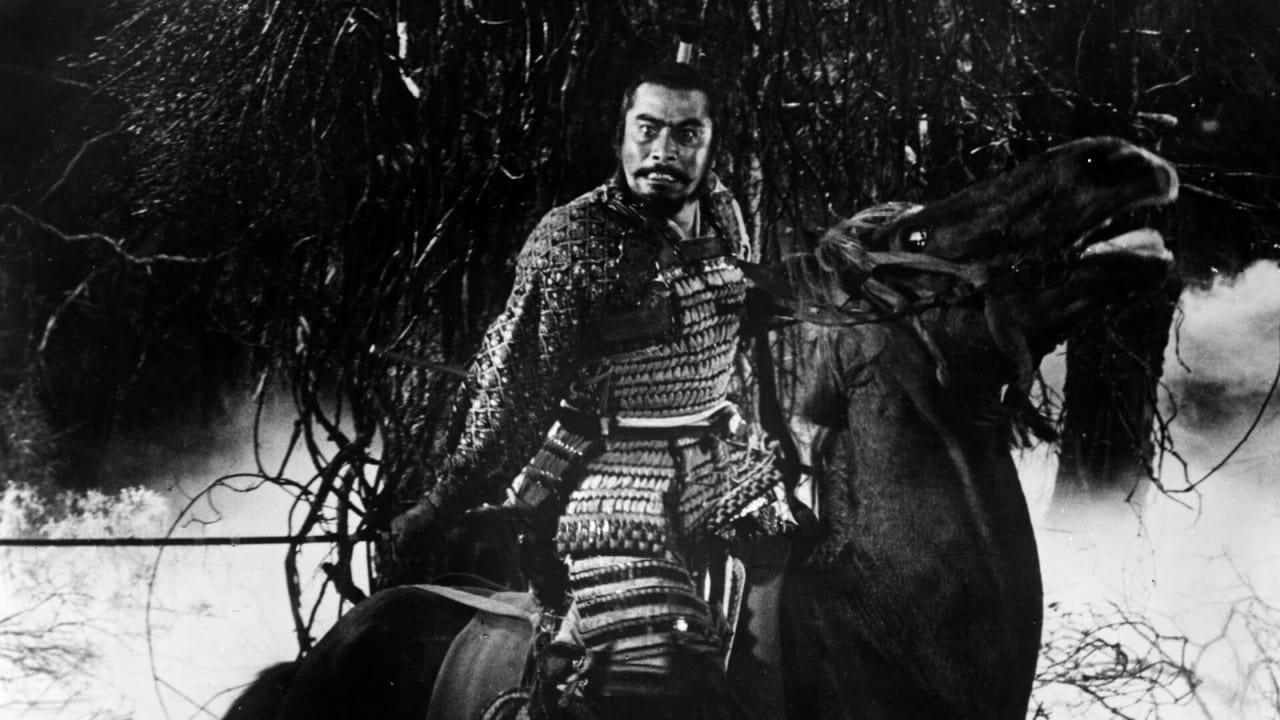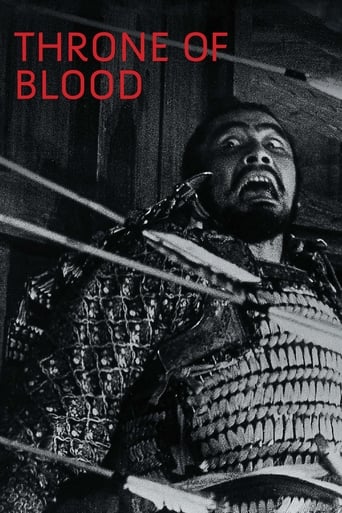

Self-important, over-dramatic, uninspired.
... View MoreThis movie was so-so. It had it's moments, but wasn't the greatest.
... View MoreAt first rather annoying in its heavy emphasis on reenactments, this movie ultimately proves fascinating, simply because the complicated, highly dramatic tale it tells still almost defies belief.
... View MoreThe movie's neither hopeful in contrived ways, nor hopeless in different contrived ways. Somehow it manages to be wonderful
... View MoreIf nothing else - I'd say that all of you fashion-trendy guys of today out there ought to feel right at home watching "Throne Of Blood" - 'Cause every male character in this film had his hair done up in one of those irksome, little ponytails, sitting on top of his head, as well.It really killed me that even when any of these male characters had been wearing a tight-fitting helmet on top of his head - Whenever that headgear was removed that goofy, little ponytail stood straight up again with no adjustments required.Anyway - I certainly found this 1957, Japanese version of Shakespeare's "Macbeth" to be quite boring. Indeed. And tedious. And any attempts made at creating an atmosphere of surrealism seemed downright silly for the most part.And - Last, but not least - What the hell was with character, Lady Washizu's eyebrows, anyway??
... View MoreViewed on DVD. Restoration = ten (10) stars. Ultimately over time a film stands or falls on its own merits, and not by high jacking the acclaim of its source material(s). This movie is yet another case study of the dangers associated with parasitic piggy backing. The script is co-written by the director, and is confusing and lacks polish (script traits usually exhibited when the director is one of two authors or the sole author). Acting by the lead male actor is mostly confined to grimaces (he looks like he needs a root canal operation due to all the scenery he has chewed on). The lead female actress employs an acting style consisting of monotonic line readings and a mask-like, unchanging facial expression. The real co-stars are the costumes which are spectacular (too bad the film was not shot in color), and in-camera special effects (especially the arrow showers at the film's end). Sets are OK, but exterior long shots of "castles" show structures that are far removed from restored/rebuilt castles of the period on view in Japan today. (Perhaps impoverished exterior sets are a result of budgetary constraints?) Subtitles are a bit long and often abrupt. Film score is fine. A highly not recommended film experience. WILLIAM FLANIGAN, PhD.
... View MoreThrone of Blood is one of my favorite Kurosawa movies, it described the ambition, which you can kill your family and your friends because of your profit.The point that I don't like about Throne of Blood is Toshiro Mifune's acting. If the first Akira Kurosawa you saw is Seven Samurai, you can understand what I mean. Because Mifune's acting in this movie isn't different from Seven Samurai, so I felt normal. Why Kurosawa always used the old cast and old acting? That is the reason that Seven Samurai is the only film I gave full stars.I think Ran (1985), which is another Kurosawa movie, is better than this film and you could call it the "remake" of this film after you saw it.
... View MoreMacbeth contains some of the most hauntingly vivid images of English literature; the bloody dagger immobilised in the air, the ghostly apparitions of the witches and a dear old friend, and that surprise that so much innocent blood could spill out of the good king Duncan, that great oceans cannot wash away this sin. Kurosawa's first of his three Shakespeares takes these powerful words and in his own style makes them terrifying. The Noh influence is clear. The three witches putting on a musical display (for the king patronage) and brewing devilish concoctions becomes a single sitting figure, powdery white, transfixed upon the spinning wheel and yet spouting haunting predictions of fate and power. Yamada's Lady Macbeth (the Waki) doesn't wear a literal Noh mask, but her face is ghostly white and might as well be frozen, unblinking and still. She settles in her eerie stance, and uses quiet lines to manipulate her husband. Watch as she turns his inward ambition and lust for power into action like the witch does with a simple phrase: "I do not agree." As she directs Washizu, the silence is penetrated by those sinister swishes of her silk trousers as she slides across the floor. Oh, it makes it so worth it when she crumbles in sight of the blood. The flute and drums burst in when Washizu is named Lord of the Northern Garrison, confirming the prophesy in his mind, and when Lady Macbeth is confronted with that sea of spilled blood, there's no Shakespearean dialogue, but a flutter of panic and fright in the stylised gestures. Washizu's frenzied slashes of his katana when Miki's ghost appears exhibit the same influence behind his demonic mask-like glare that seems ever present. This is a film that personifies visual dread. A plentiful of scenes are consumed by a thick fog, none more-so than the few minutes of nothing but riding where Washizu and Miki gallop around in a field that has utterly no escape. They careen around and around, riding up towards the camera before turning another way in futility. Earlier as they navigate the Spider Web's Forest, Kurosawa utilises the elements as he always does; the torrential rainfall pours down upon the pair, the thunder crashes and bangs, and the camera tracks them from behind a tangled mass of tree trunks and branches, as they hurriedly try to escape this storm. For all his ambition and might and military prowess, Washizu is not a man of great foresight, this seems to signal. Throne of Blood is bookended by a haunting youthful chant depicting a ruined castle, warning of the dangers of delusion and desire for power. This adds an extra layer of foreboding after the witch's premonition of Miki's royal offspring; absolute power corrupts absolutely. Fog billows into the castle, a flock of birds signal ill omens, but that classic cackle dissuades them all of worry. It is said that real arrows were shot at Mifune in that climatic betrayal. Whether it is this real horror in Mifune's face or a fantastic performance does not matter. It is a ominous ending as he shrieks in full disbelief of treason to kill the great lord and of the forests rising; his eyeballs seem to almost pop right out in frenzied terror. Power have consumed him, and he does not realise the irony of his accusation. There is a low-angle shot just before the shower of arrows, that is traditionally used to signal power and dominance, yet Washizu is considerably tiny on top of the tower, thundering down at his army to hold their ground. How indeed does treachery rear its ugly head. If anything could top this it is the reveal of the armies clutching those trees, branches billowing in the fog and breeze. No theatre production could ever match this image in its sheer scale and captivation. The Great Birnam Wood is truly coming for him.
... View More